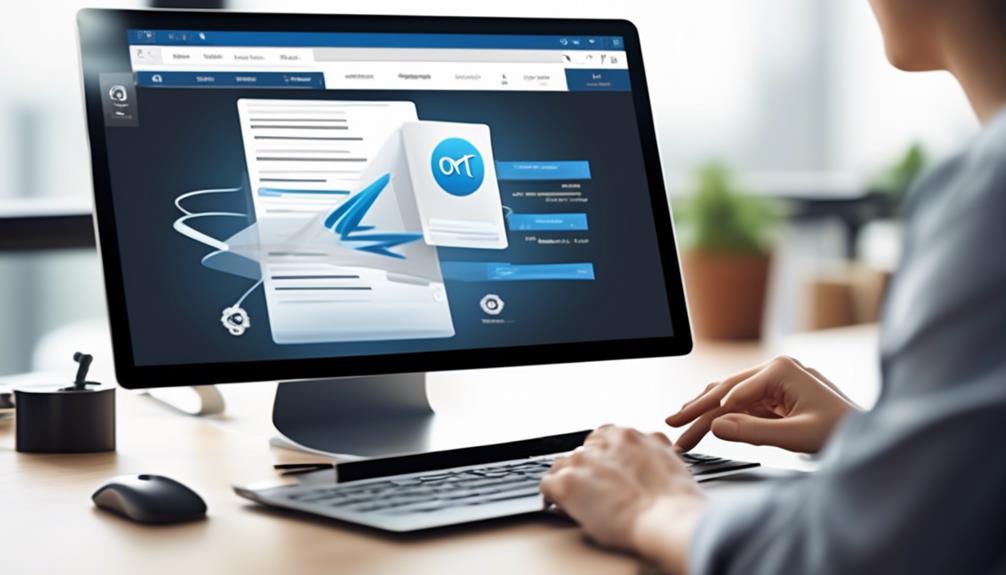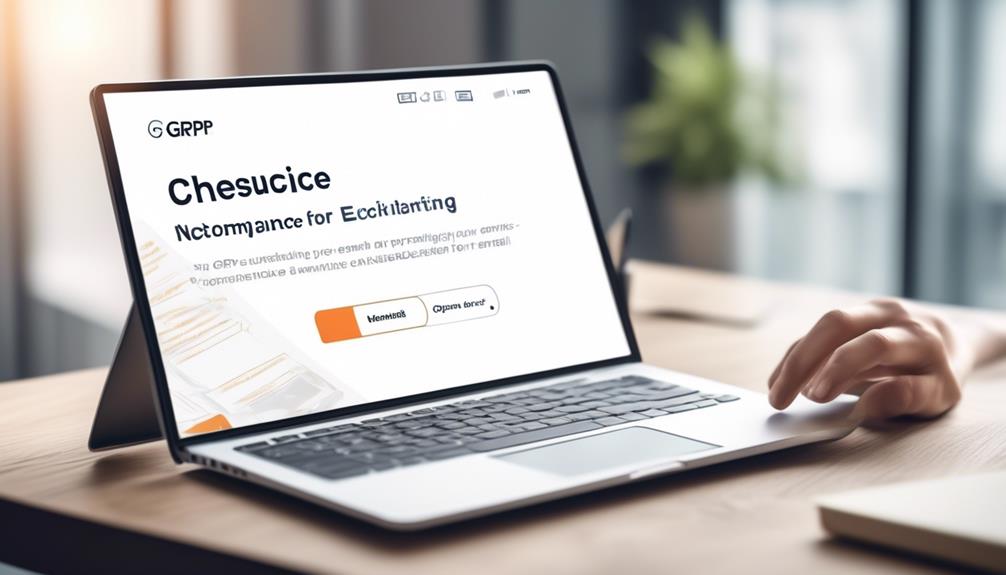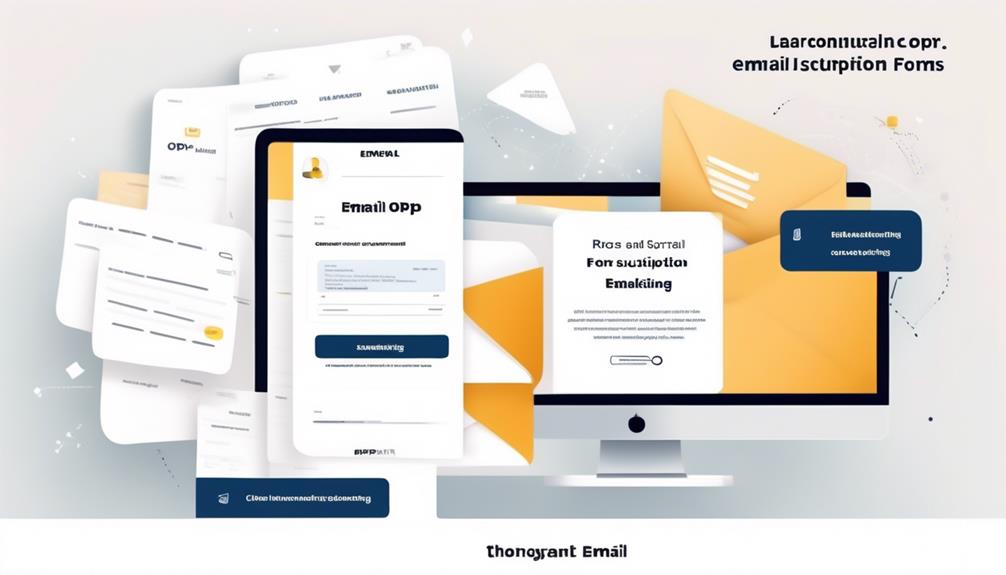As professionals in email marketing, we must carefully balance engaging our audience with respecting their privacy. With stricter data protection laws in the current digital landscape, it is crucial to find a compromise that honors our subscribers’ rights while still effectively connecting with them.
As we navigate the complexities of GDPR compliance, there are seven key tips that can significantly impact our email marketing strategies and ensure that we stay on the right side of the law. These tips not only address the legal requirements but also contribute to more targeted and effective campaigns, reduced risk of fines and penalties, improved data security and privacy practices, and a strengthened brand reputation.
Key Takeaways
- Explicit consent is mandatory for processing personal data for email marketing under GDPR.
- Implement robust consent management systems to track and record consent.
- Regularly review and update consent agreements.
- Maintain comprehensive and secure records of consent.
Consent Requirements
Ensuring compliance with GDPR consent requirements for email marketing is crucial for maintaining data privacy and avoiding legal issues. Under the GDPR, obtaining explicit consent is mandatory for processing personal data for email marketing. This means that individuals must freely, specifically, and unambiguously consent to their data being used for marketing purposes.
To manage consent effectively, email marketers should implement robust consent management systems to track and record consent from subscribers. Additionally, the opt-in method should be used, and proof of consent must be retained to demonstrate compliance. Legacy contacts also require repermissioning to ensure that their consent meets GDPR standards.
Every marketing communication should include a clear and easy-to-access unsubscribe link, allowing individuals to opt-out at any time. It's essential to regularly remind subscribers of their right to withdraw consent and provide them with easy mechanisms to do so.
Data Minimization Practices
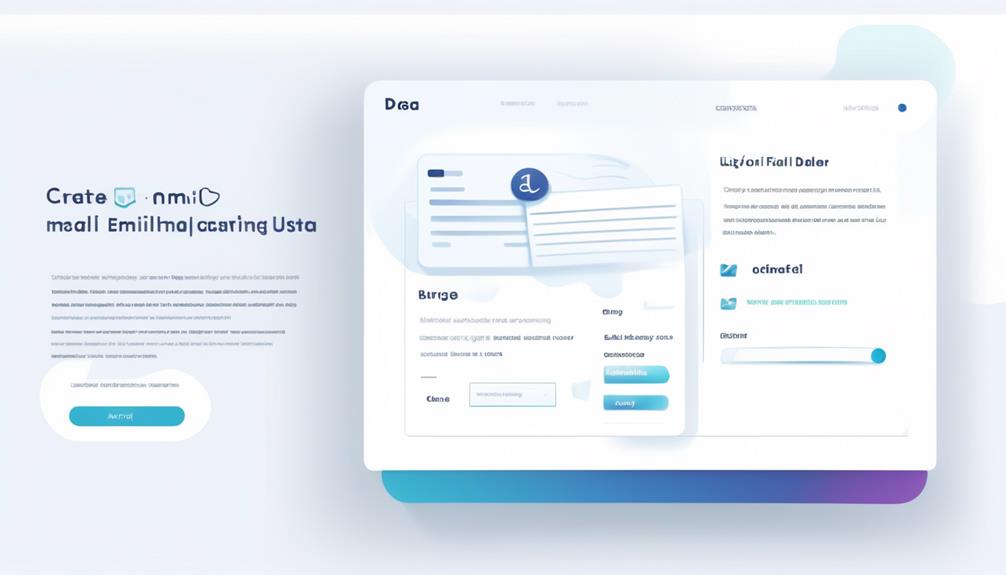
As email marketers, we must prioritize limiting the data we collect, securing the storage of that data, and regularly reviewing the information we have.
By only gathering the necessary personal data and regularly reassessing what we store, we can reduce the risk of privacy violations and data breaches.
Implementing clear processes for data deletion and obtaining explicit consent for each purpose will further ensure GDPR compliance.
Limit Data Collection
To comply with data minimization practices, email marketers should collect and retain only the necessary data for email marketing purposes and ensure clear and specific consent processes for data collection. This approach aligns with GDPR requirements and demonstrates a commitment to privacy and data protection. When limiting data collection, consider the following:
- Clear Communication: Inform individuals about the purpose and duration of data collection for email marketing, ensuring transparency and compliance with privacy regulations.
- Regular Consent Review: Review and update consent agreements regularly to adhere to data minimization principles and maintain compliance with GDPR.
- Accessible Withdrawal Options: Provide individuals with accessible options to withdraw their consent for email marketing data collection, respecting their right to privacy.
- Security Measures: Implement robust security measures to safeguard the processed personal data, maintaining its confidentiality and integrity.
Secure Data Storage
When it comes to email marketing, securely storing only the essential personal data is crucial to align with data minimization practices and maintain GDPR compliance. It's vital to evaluate and minimize the amount of personal data collected and stored, ensuring it aligns with the GDPR's data minimization principle. Regularly reviewing and updating data storage practices is essential to ensure compliance with GDPR requirements. Employing pseudonymization and encryption techniques can reduce the amount of personally identifiable information stored, in line with GDPR's data minimization principles. Here's a table highlighting key points for secure data storage in email marketing:
| Key Points | Description |
|---|---|
| Minimize Data Collection | Evaluate and minimize the amount of personal data collected and stored. |
| Pseudonymization | Consider employing pseudonymization techniques to reduce personally identifiable information. |
| Encryption Techniques | Use encryption to secure stored personal data in compliance with GDPR. |
Implementing these practices ensures secure data storage, aligns with GDPR requirements, and protects personal data privacy.
Regular Data Review
Regularly reviewing and minimizing the personal data collected is essential to ensure compliance with data minimization practices under GDPR. When it comes to email marketing, data review is crucial for maintaining GDPR compliance and respecting privacy rights of EU citizens.
Here's how to effectively implement data minimization practices:
- Conduct periodic audits to ensure only necessary personal data is collected and processed.
- Implement processes to clean and update mailing lists regularly, removing unnecessary or outdated personal data.
- Document and maintain records of specific purposes for using personal data in email marketing.
- Establish clear consent mechanisms for individuals to opt-out and manage their data in line with GDPR's data minimization principles.
Obtaining Explicit Consent
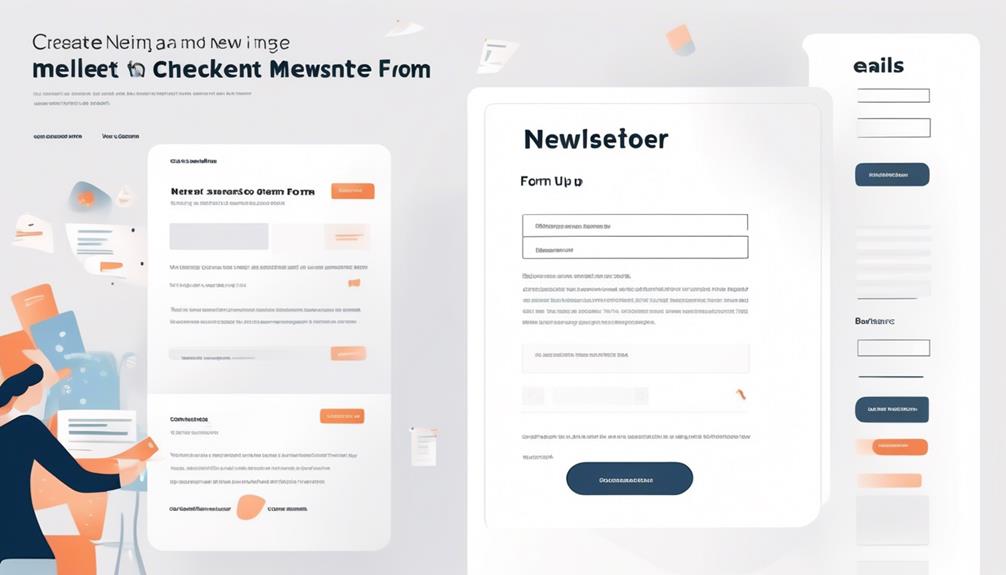
We clearly communicate the purpose of data collection and obtain explicit consent for email marketing to ensure GDPR compliance. Obtaining explicit consent from subscribers is crucial, as individuals have the right to confirm their consent before receiving marketing emails. To achieve this, we implement a double opt-in process, where individuals actively confirm their consent. This ensures that the consent obtained is valid and unambiguous. Additionally, we separate consent requests from terms and conditions, making the consent specific, informed, and clear. This practice not only aligns with GDPR compliance but also builds trust with subscribers. Moreover, providing easy opt-out options in every marketing communication and promptly honoring withdrawal of consent is essential. To maintain GDPR compliance in email marketing, we regularly review and update consent agreements. This ensures that our practices remain in line with the evolving regulatory requirements and demonstrates our commitment to respecting the privacy and preferences of our subscribers.
| Obtaining Explicit Consent Strategies | Benefits |
|---|---|
| Double opt-in process | Valid and unambiguous consent |
| Separate consent requests | Specific, informed, and clear consent |
| Easy opt-out options in every communication | Respect subscriber choices |
| Regular review and update of consent agreements | Compliance with evolving regulations |
| Clear communication of data collection purpose | Build trust and transparency |
Secure Data Handling

Having obtained explicit consent for email marketing in accordance with GDPR regulations, our focus shifts to ensuring secure handling of personal data through robust encryption and access controls. To effectively handle personal data and maintain GDPR compliance, we must:
- Implement Encryption and Access Controls: Utilize encryption methods and strict access controls to safeguard personal data from unauthorized access or breaches.
- Establish Clear Procedures and Regular Audits: Develop clear procedures for data handling and conduct regular audits to ensure compliance with GDPR regulations and maintain the accuracy and relevance of our mailing lists.
- Provide Easy Opt-Out Options: Include clear and easy opt-out options in every marketing email, ensuring that the process is free-of-charge and straightforward for recipients.
- Train Employees and Establish Data Breach Response Plans: Educate employees on data protection practices and establish comprehensive data breach response plans to effectively address and mitigate any potential breaches, thereby upholding GDPR compliance in data handling.
GDPR-Compliant Email Practices
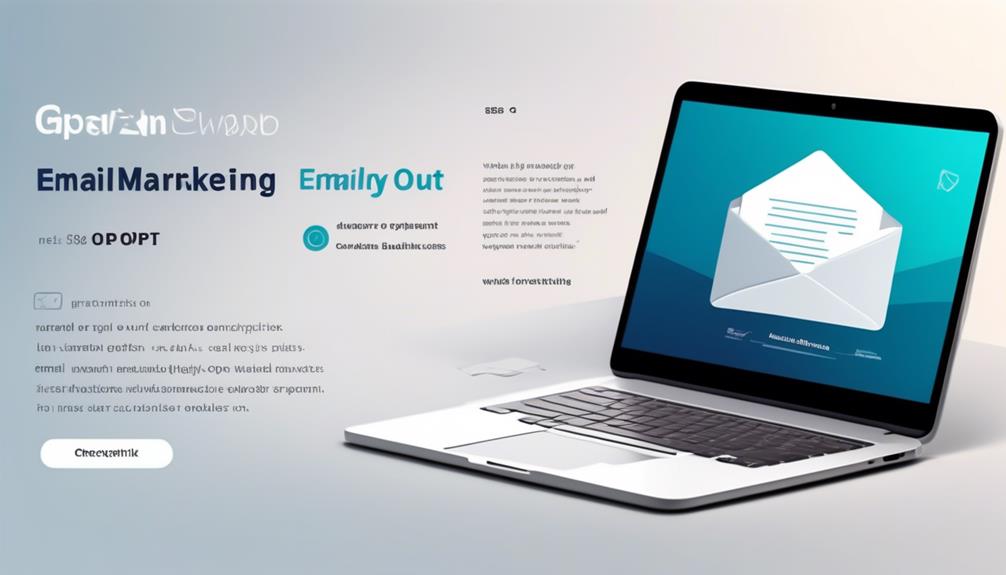
When ensuring GDPR compliance in email marketing, it's essential to obtain explicit consent from individuals before sending any marketing communications. Clearly stating the lawful purpose for collecting and using personal data in email marketing is crucial for compliance. Implementing a double opt-in process for subscribers to confirm consent adds transparency to your practices. Furthermore, providing easy and clear opt-out mechanisms in every marketing email is necessary to respect individuals' privacy rights.
Regularly auditing and cleaning mailing lists is essential to maintain GDPR compliance and build trust with customers. It ensures that data retention is in line with GDPR requirements and that only individuals who've given explicit consent receive marketing communications.
As email marketers, it's our responsibility to prioritize the security and privacy of EU citizens' data. By following these GDPR-compliant email practices, we demonstrate our commitment to data protection and build credibility with our audience. Compliance with GDPR not only safeguards individuals' privacy but also enhances the reputation and trustworthiness of our marketing efforts.
Double Opt-In Implementation
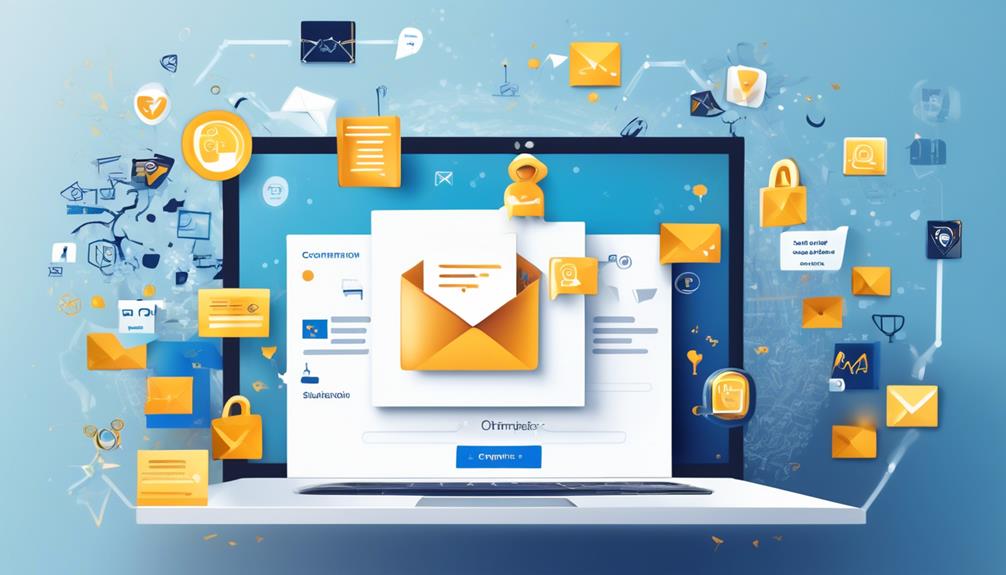
Transitioning from GDPR-compliant email practices, the implementation of Double Opt-In is a critical step for email marketers to enhance consent verification and reduce the risk of unauthorized sign-ups. Double Opt-In requires individuals to confirm their subscription twice, ensuring that they genuinely intend to subscribe and understand what they're signing up for.
Here's why it's crucial:
- Reduced Risk: By requiring a second confirmation, the risk of unauthorized sign-ups is significantly reduced.
- Consent Verification: Double Opt-In provides a clear audit trail of consent, essential for demonstrating GDPR compliance.
- Quality Improvement: Implementing Double Opt-In can enhance the quality of your email list, ensuring that your subscribers are genuinely interested in your content.
- Engagement Boost: It helps improve engagement levels as subscribers who've confirmed twice are more likely to be genuinely interested in your emails.
In the context of GDPR and data protection, Double Opt-In is an effective method for ensuring compliance with the regulation's consent and data retention requirements, ultimately protecting the personal data of EU data subjects.
Record-Keeping for Compliance

Maintaining meticulous records of consent is essential for demonstrating compliance with GDPR requirements for email marketing. As email marketers, we understand the significance of record-keeping in ensuring adherence to data protection regulations.
It's imperative to document the specific lawful basis for processing subscriber data for email marketing and to keep a record of how consent was obtained. This includes details of the opt-in method used, proof of consent, and any subsequent opt-out requests.
Regularly reviewing and updating these consent records is crucial to reflect any changes or withdrawals made by individuals, thereby ensuring that the stored information remains accurate and up to date.
Furthermore, it's essential to implement a robust system for capturing and securely storing consent information. This not only fulfills record-keeping obligations but also demonstrates a commitment to the security and privacy of subscriber data.
Clear and distinct consent from individuals for the processing of their personal data for email marketing purposes is a fundamental aspect of compliance. By maintaining comprehensive and secure records of consent, we can confidently comply with GDPR requirements and build trust with our subscribers.
Frequently Asked Questions
How Do I Comply With GDPR Email Marketing?
We comply with GDPR email marketing by obtaining clear consent, offering an easy opt-out, and ensuring all data collection is transparent.
It's crucial to interpret and follow GDPR rules carefully, providing proof of consent and keeping opt-out methods simple and free-of-charge.
Our compliance hinges on adhering to specific consent requirements and implementing opt-in processes.
It's imperative to understand and follow all GDPR regulations to ensure our email marketing practices are compliant.
What Is the GDPR Fine for Email Marketing?
The GDPR fine for email marketing can be substantial if organizations fail to comply with the strict regulations. It's crucial for email marketers to obtain clear consent from recipients and provide opt-out options.
Non-compliance may result in hefty penalties, as demonstrated by the €9 million fine imposed on Austrian Post.
Adhering to GDPR guidelines is essential for protecting both the organization and the privacy rights of individuals.
What Are the 7 GDPR Requirements?
We ensure GDPR compliance by meeting seven key requirements.
These include obtaining clear consent for data collection and email marketing, providing opt-out options, and maintaining proof of consent.
Our approach focuses on building trust with customers and engaging them while upholding legal standards.
These measures allow us to capture consent effectively and meet GDPR obligations.
What Are the GDPR Rules for Sending Emails?
We ensure GDPR compliance when sending emails by obtaining clear consent and providing opt-out options in every communication. Personal data is collected with explicit consent, and we maintain proof of consent for marketing purposes.
We remind individuals of their right to opt-out in each marketing message. These practices align with GDPR requirements for email marketing, allowing us to operate within legal boundaries and respect individuals' data privacy rights.
What Are the Essential GDPR Compliance Tips for Email Marketers?
Email marketers must adhere to the best practices for GDPR compliance in order to protect consumer data. Obtaining clear consent, maintaining an updated database, and providing opt-out options are crucial. Additionally, conducting regular audits and staying informed about GDPR regulations are essential for email marketers to remain compliant.
How Can GDPR Compliance Improve Email Open Rates in 2024?
In 2024, companies that prioritize GDPR compliance can expect to see a positive impact on their email open rate forecast. By ensuring that their emails are permission-based and provide valuable, relevant content, businesses can build trust with their audience and ultimately improve their email open rate forecast.
Conclusion
In conclusion, implementing GDPR compliance tips for email marketing is crucial for maintaining trust with our audience.
Did you know that 67% of consumers are more likely to engage with brands that prioritize their data privacy?
By following best practices, we can build stronger relationships with our subscribers and ensure that our email marketing efforts are both effective and compliant.

